#the avvar
Explore tagged Tumblr posts
Text
What Avvar mage training tells us
Not enough people talk about the Avvar, which is a shame because they have some amazing history and practices. I find the way they handle mages to be especially enlightening and based as fuck.
So I made this post to summarise it!
In the above video, I captured two conversations with the Augur of Stone-Bear Hold, and Sigrid - the mage-in-training who went into a self-imposed exile. I'll summarise what mage training looks like for the Avvar, and then delve into the implications.
Augurs are the spiritual leaders of the Hold, but are not necessarily mages - though they often are.
Spirits are called 'gods' by the Avvar. The Avvar do also have named gods, and these appear to be particularly powerful spirits.
Mages among the Avvar bind themselves to a spirit in order to be trained - i.e., they become 'abominations' in the eyes of the chantry, which Dorian confirms in the video. This occurs at a young age, in Sigrid's case when she was a child.
The spirit becomes the mage's trainer. Years later, when the training is done, the mage releases the spirit in a ritual which requires only a small sacrifice (like a bird) and a vial of lyrium.
If a mage cannot release the spirit, then the situation is handled carefully. In Sigrid's case, she just didn't want to say goodbye to a good friend. She goes to the Augur after this, and he confirms that they are working on helping her overcome her loneliness.
If the reason is they are truly incapable of releasing the spirit (they are 'weak', though it's unclear what this means), then the Hold and spirits watches over them to prevent them from growing 'sick'. The Augur implies that if the mage does sicken and endangers themselves or the Hold, they are euthanised and pass away peacefully in their sleep. He says it is a very sad event.
What are the implications of this, then?
Reversing 'possession' can actually be really easy. We knew it was possible from DAO, but now we see that it need not require a massive amount of lyrium or blood magic. If the 'possession' does not happen in a state of extreme desperation/distress (which the Circle and Templars love to put mages in), then reversal is simple.
Mages who cannot release the spirit might 'sicken' - and I suspect that's what they tried to show with Anders. What 'sicken' means is not clarified by the Augur, but from our Anders experience we can piece together that the Augur means they grow mentally and physically unwell. But even this can be prevented or mitigated with proper care.
It appears to be very, very rare that mages among the Avvar turn into the types of abominations we fight in the games, because the Augur never even mentions it happening.
So, in conclusion: The Avvar treat their mages with the most humanity and compassion of everyone, resulting in very few instances of violent abominations.
(Note: tbh I have no idea wtf the Dalish mage training is like because the games contradict themselves even within the same clan, so I can't really draw comparisons to the Dalish, unfortunately.)
#dragon age#dragon age inquisition#dai#da2#dao#avvar#mages#mage rights#the avvar#dragon age origins#dragon age 2
536 notes
·
View notes
Note
MaY i ReQueST a PaGE of HeaRT ANalySis pLeaSe? tHAnk u So MuCHJ
The Page of Heart [symbols: pawn, heart]
The Page class has its basis in the medieval squire. An example would be King Arthur from Arthurian Legend. It is also based on the sidekick trope, such as Robin from Batman.
The Heart aspect’s main theme is instinct. You can find its official description here.
A Page of Heart is among those who use the individual’s impact. This is the “classpect group” they belong to. Members include: the Knight, Page, Thief, and Rogue of Heart/Mind. These classes are all opposites or inverses of each other that use the Heart/Mind dichotomy (the individual’s impact). A description of classpect groupings can be found here.
The Page of Heart passively utilizes the Heart aspect. Passive classes are guided by others or act for the benefit of others. They are more likely to be kind, but less likely to stand up for themselves. Knights and Pages use their aspect and everything it symbolizes as a tool. Simplified, the Page of Heart is motivated by others to utilize instinct.
In personality, the Page of Heart has trouble seeing what they’re good at and is invested in self discovery. Personality descriptions can be found here.
Their archetype is the Believer Free Spirit, defined by confidence and instinct. Archetypes are explained here.
Their opposite is the Knight of Mind, who actively utilizes intuition.
Their inverse is the Thief of Mind, who actively steals intuition.
A classpect or ���god tier” is an individual’s best self. All classpects go through a journey from unrealized, to struggle, to realized. When a character is unrealized, they neutrally exist as their inverse. On their struggle, they will wildly flip back and forth between their inverse and true classpect. In their worst moments they will act as their inverse, in their best their true classpect. When realized, they will stabilize as their true classpect. They will still have room to grow, but will become happier, more successful people.
This means that the Page of Heart begins life motivated by themselves to steal intuition. When their struggle arrives and they are at their worst, they will continue this behavior in negative extremes. However, when at their best, they will find purpose in instead utilizing instinct for others. When realized, they will stabilize and continue to utilize the Heart aspect passively, in a positive way.
They share their archetype with the Rogue of Hope, the Free Spirit Believer.
The Page of Heart would quest on a planet similar to the Land of Earth [Page] and Heart [Aspect]. An example would be the Land of Croquet Courts and Madness. An explanation of planet naming conventions can be found here.
Two possible gods, or denizens, to reign over their planet would be Aphrodite (Goddess of Love) or Yaldabaoth (Trapper of Souls). Other Heart aspect denizens can be found here.
When the Page of Heart completes their planet quests and dies on their quest bed, they would rise to ascension on the wings of ladybugs (symbols of love). A list of soul animals can be found here.
The characters that I have currently classpected as Pages of Heart are: Allan from Barbie: The Movie, Jervis Tetch from Batman, the Ptarmigan from Dragon Age, Josmael from Dragon Age, and Steven Universe from Steven Universe.
If any of the links not connected to my blog break, the content can be found on my Google Drive.
Official Aspect Descriptions
Personality Descriptions
Aspect Denizens
#page of heart#god tier analysis#classpecting#homestuck#my post#ask#allan barbie#jervis tetch#the avvar#josmael#steven universe#barbie the movie#batman#dragon age
19 notes
·
View notes
Text
anyway dai solas you will always be famous to me. nothing but respect for my boy who wandered off mid-cutscene in the hinterlands to go help out refugees, is extremely good at Lies Of Omission™️, has a whole spy/agent/informant network of elves who followed him, fervently argues that it's unethical to be happy about killing bandits bc they had lives and loved ones, describes his own temple(?) prison(?) as having "indecipherable" elven writing, has ferocious debates with dorian and iron bull about slavery, set himself on fire once by mistake, and within about a year of his 10000 year lifespan, went from seeing all the world as disposable emotionless husks, to developing actual friendships and even falling in love.
and then! still thought it was necessary to destroy and reset the world! but he would treasure the chance to be wrong again!!
#dragon age#solas#veilguard critical#txt#look. if you set up ''this character is extremely smart and generally cares about people''#and then add ''they're doing something completely unhinged and destructive sounding''#then the conclusion should not be ''wow this dumbass is just doing it to ~drown the world in demons 🙄~“#there needs to be an actually satisfying back and forth even IF the conclusion is that the veil stays up#personally i think. elf immortality is overrated and mortality SHOULD be part of thedas bc it is not actually silmarillioncore#but man. maybe just turn the veil down to like 30% opacity like it is for the avvar. they're chilling.#defibrillate the titans a bit (gently) and then it's fine. just a fun high fantasy setting#anyway it becomes like the anders effect where the like#7 years of unpaid frontline healthcare get Utterly Outweighed by one kind of inevitable act of violence#imo an underrated part of solas' character is that he presumably passed out at the worst possible blight-riddled tyranny era of arlathan#and then woke back up to a blight-riddled and tyrannical future#but he missed both the several hundred years before tevinter attacked arlathan#and the dales#and the early chantry which seemed significantly cooler than the later chantry#i got lost in my tag essay but i think solas' most evil crime was mistranslating all those inscriptions#academic malpractice. get his ass. 1000 years dungeon until he does it properly
1K notes
·
View notes
Text
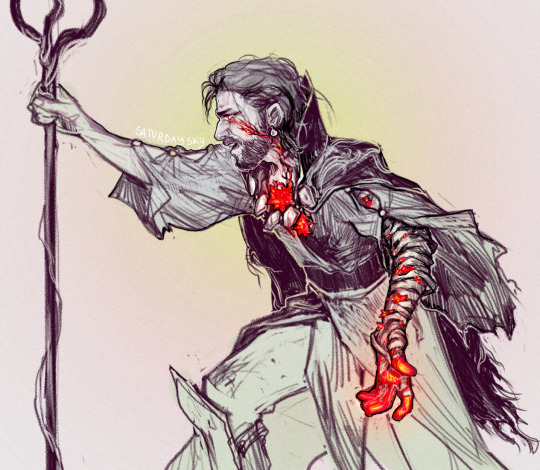
Gale of Minrathous
Dragon Age AU where Gale is a Tevinter magister who accidentally infected himself with red lyrium. He's found a way to halt the lyrification. Mostly.
More tidbits:
Devout Andrastian with a bit of Leliana's "the Maker speaks to me" thing going, except it's "Andraste—so obviously a mage btw, I have 5000 words prepared and ready to go on this topic—sings to me, magic prodigy"
"therefore I am sure to be the one to unlock the secrets of this powerful, strange new lyrium that is singing to m—oh. golly. that went poorly"
joins the inquisition after he emerges from isolation and his former peers have all become Venatori. If his own folly has emptied the sand from his hourglass, why not spend the little time that remains to him serving Andraste's chosen?
0 moral qualms about blood magic except that all participants must be willing. All magic is neutral—its use determines whether it is good or bad
Tara is his possessed cat, who has lived far longer than a cat should, but Gale isn't complaining. who says abominations can't like chin scritches
talks about Minrathous, a lot
would break open the heavens to see the throne of the Maker, just for the experience
Final AU thoughts under the cut!
what the magisterium doesn't want you to see:

the staff that I know, deep in my heart, Gale uses and insists is artistic:

#there is a vast vast bg3-dragon age fusion in my mind#the tadfools are an inquisition away team like the ones you play in multiplayer#wyll is a chevalier who has become an abomination#karlach is a qunari who got fenris'd by magister gortash and has powers that are slowly killing her#shadowheart is from the cult of andraste that used to hold Haven#lae'zel is an elven viddathari#mayhew - my tav - is a dwarven lyrium smuggler whose impossible secret is that he wants to *be* magical. also he totally smuggled red lyrium#jaheira - city elf elder who has secret dealings with the dalish. secret apostate#minsc is avvar#halsin is a dalish keeper#bg3#gale dekarios#dragon age#my art
1K notes
·
View notes
Text
#I brought bull with me for most of the dlc and it was like... bull's best/worst day ever#on one hand: demon crap demon crap everywhere. on the other hand: fought a huge fuck-off dragon at the end of it . life is a balance#dragon age#dragon age inquisition#jaws of hakkon
tags via @vaguely-concerned
I just replayed jaws of hakkon again and the avvar still fucking rule honestly haha. listening to all these chantry-educated people (listen I love you all but you are being so RUDE I can't take you anywhere!!!!) lose their goddamn minds over how they treat magic while the avvar side eye them like '...okay weirdos' never fails to bring me joy.
BUT also since the avvar take a bunch of inspiration from scandinavian culture, I thought I'd put on my friendly neighbourhood norwegian hat and muse about some of them!
- most people probably know this by now, but 'storvacker' means literally 'big beautiful' with swedish spelling haha. (with kind of an implication that it's beautiful because it's big, or that the bigness is integral to the beauty? it's really quite sweet as a name)
- hakkon seems to be a riff on håkon/haakon (listen I don't have time to explain all the tedious langague history right now but let's say for short that the pronounciation is the same either way and from a norwegian pov it has a lot to do with being under danish rule for a couple of hundred years there) which is a very common name for scandinavian kings through the ages. and yes a bunch of them did love them some war so it's not a bad choice at all! the current norwegian crown prince is named haakon (and his dad is harald, which is one of the other most common name for kings. there's also a 'sverre magnus' in the family now, so between them they hit about 75% of all norwegian kings through the ages lmao)
- avvar poetry works somewhat along the lines of traditional norse poetry, being heavy on the alliteration and kennings and heiti (essentially turning perfectly normal words into metaphors and shit, calling a boat a 'wave-steed' would be an example, often to ensure the alliteration haha. one of the reasons odin has so many fucking names, you can find a way to alliterate that dude with just about anything through pseudonym.)
- more on names because it's h i l a r i o u s to me for some reason-- the fisherman dude you meet on the shore and who would otherwise be perfectly forgettable? well, his name is arvid rolfsen. having a character named 'arvid rolfsen' in a fantasy universe is like... that's just a normal man. like 'that's the name of my denist' level of just some guy. dragon age often does the fantasy name balancing by having at least either the first name or surname be kind of unusual/fantasy-ized, but those are simply two incredibly common names hahaha.
avvar names ending in '-sen' and '-dotten' is a very obvious parallel to how scandinavian surnames traditionally work (and still do in iceland), in that it's 'parent's name' + sen/son (son) or dotter/dottir (daughter). however. in changing the female ending of that to 'dotten'. some Things have happened, to my norwegian ear. namely that 'dott' (which turns into 'dotten' in the definite singular form, the dott as it were) means... hm.
1) most literally, something like a small untidy ball or clump of something, like hay, dust, wool -- my instinctive translation would be something like 'fluffball', probably.
2) a useless weakwilled hapless and naive but ultimately harmless person
3) slang term (though a mild one) for the vagina. yup it's another one of those, as if boba 'fett' didn't already fill that particular cross-language hilarity niche (though that one is a whole league more obscene and technically dialect). especially 'kuldsdotten swamp' (so something like... the cold ahem ahem swamp) conjures... Imagery.
74 notes
·
View notes
Text
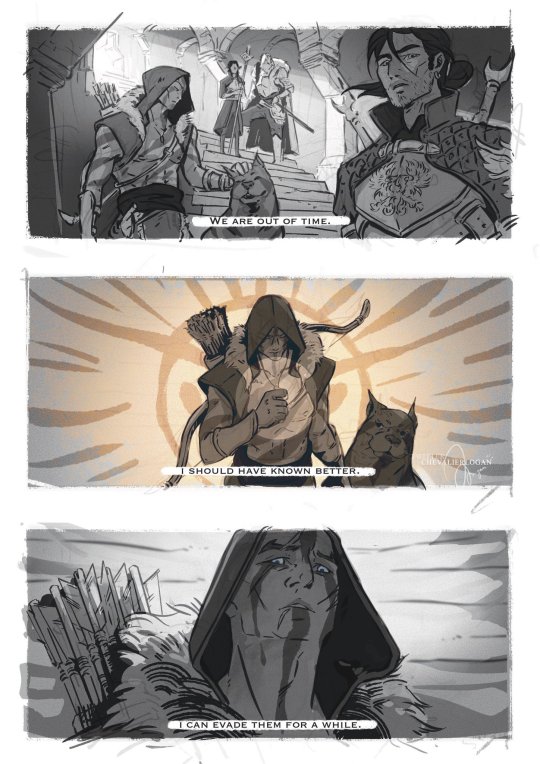
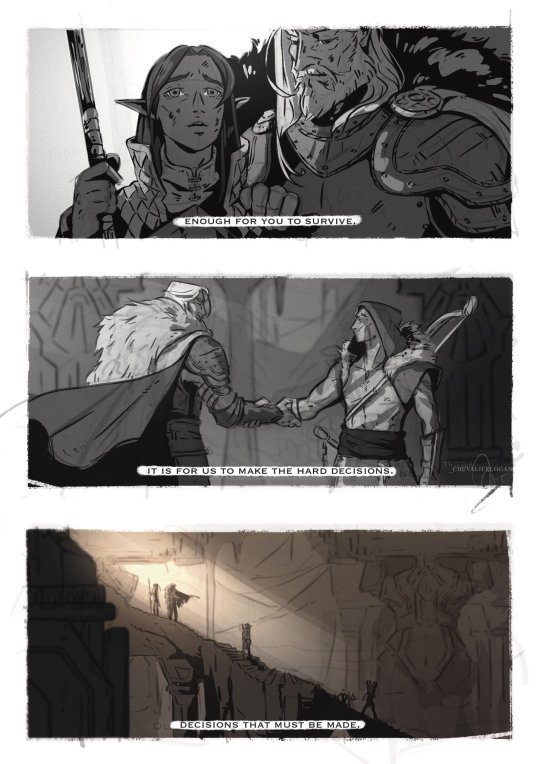
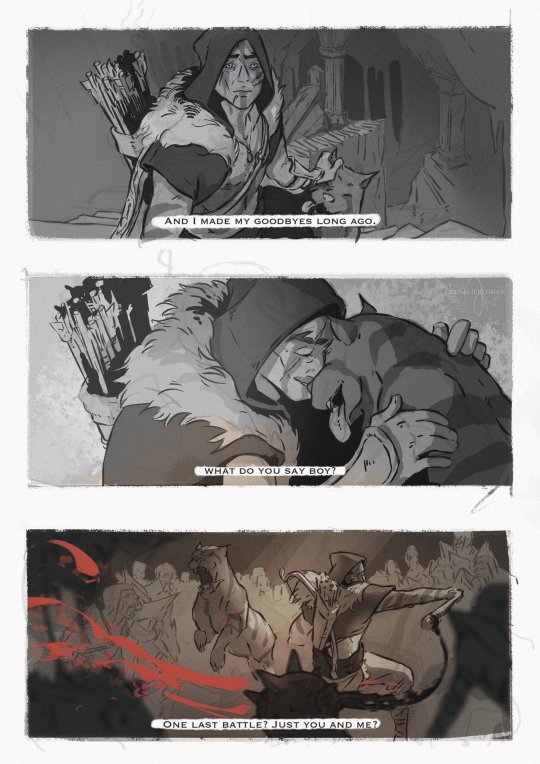
“Do you need to say good-bye?” Maric asked him cautiously. He shook his head. “No,” he rasped. “I did that long ago.” - Dragon Age: The Calling
#dragon age#bioware#legend mark zine#grey warde#grey warden#the calling#fiona#duncan#kell ap morgan#avvar#maric theirin#my art
956 notes
·
View notes
Text
honestly I absolutely love the Avvar in Jaws of Hakkon. How they worship the gods, how they view the world around them, how accepting they are and just how interesting they are too. I absolutely despise how the Inquisitor and Companions make commentary as if they're stupid or wrong in their beliefs, or that they're "just crazy people who worship spirits".
The dialogue you don't choose or even the ones you do are on the line of condescending, and it's frankly insulting, especially that all options on the dialogue wheel fall on that line.
the Avvar are so fucking cool, I hate we only get a DLC with them. (I also miss the Chasind - I wish they weren't forgotten or left in the dirt by BioWare :( )
#dragon age#dragon age inquisition#dragon age: origins#dai#avvar#chasind#wish we got to learn more about them#also miss the chasind tbh#i know so little about them and at one part i thought the Chasind and Avvar were one and i was very wrong lol#its so close to the notion of colonization being necessary to save savages and its frankly quite gross#maybe im overthinking it but i really hate the inquisitor asking questions like 'but you just mean spirits not gods' in such a rude tone#like ok??? so they believe the local spirits are their gods as they shape the world around them#which even Dorian agrees with !!! he admits spirits often do shape the outside world where the veil is thin or when they have the chance#like during battle!!!#but sure inquisitor + company theyre just crazy 🙄
503 notes
·
View notes
Text

Avvar Companion Card ft. Gunnjar
#my art#art#gunnjar#avvar#dragon age fanart#dai#dragon age#tarot card#tarot design#ehhh i think its done?#i'm at the point where i might overwork it so imma just post and leave it be for now#dragon age tarot#maybe i'll post a side by side of the first one i did?
368 notes
·
View notes
Text
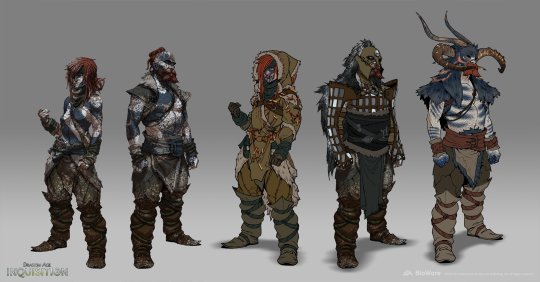
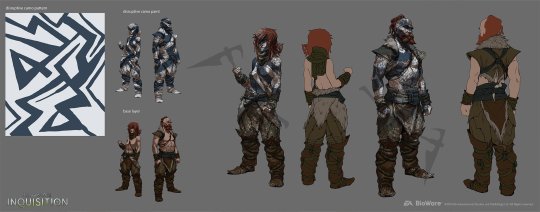
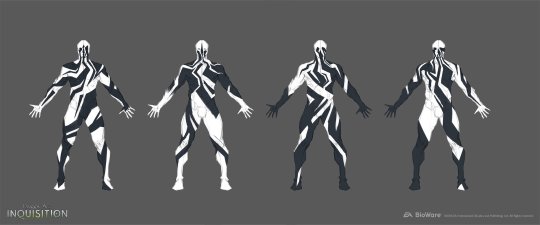
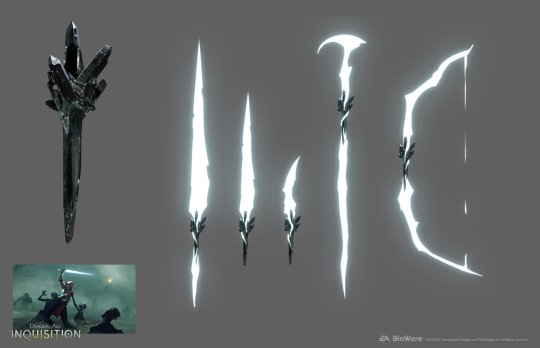
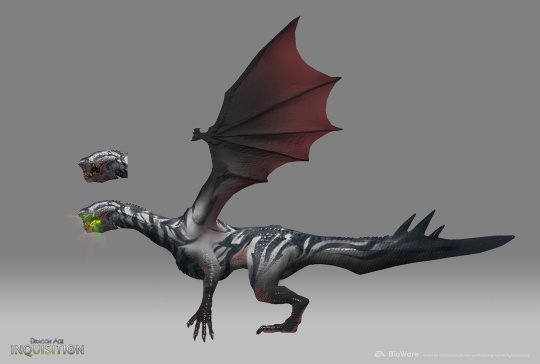
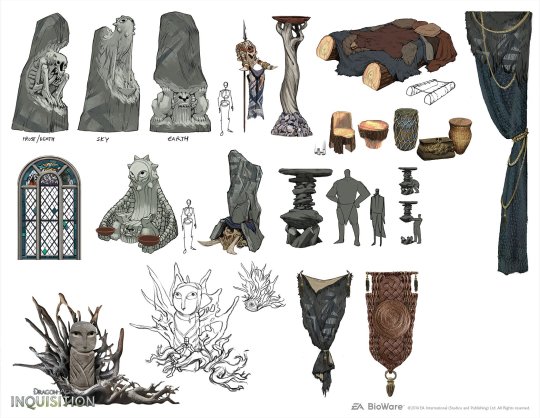
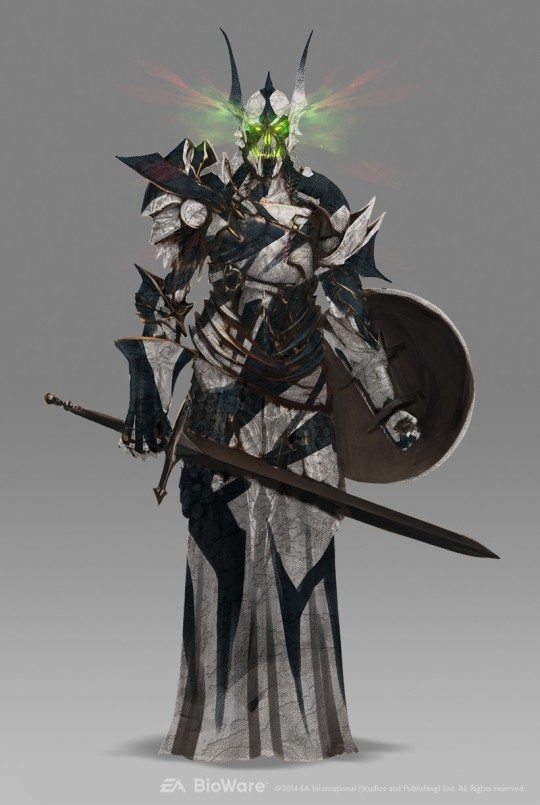
Avvar from the Jaws of Hakkon DLC by Matt Rhodes
Concept Art Game Look
173 notes
·
View notes
Text
Every chantry symbol in Miranthous is wrong. Every detail, every big statue, every enviroment has been designed so carelessly in this game. They don't even know that the Imperial Chantry has a particular symbol that separates them from the Orlesian Chantry of the rest of Thedas...
#dragon age spoilers#dragon age critical#enviromental telling is SO DEAD in veilguard...#they put a lot of avvar statues and resources in nevarra...#and Miranthous is filled with Orlesian statues... like... you are the main reason why the chantry had a schism#WHY are you going to use their art in your main city????#I accept if they made Treviso 100% orlesian with 3 statues of crows that were new.....#treviso is fancy and you can assume the deep relationship they have with orlais can justify these copy-paste in resources#but you have not way to do that with Miranthous... it's Tevinter!!!!#gods.... how they destroyed Tevinter....
171 notes
·
View notes
Text
Thinking about how the Avvar had a ritual to separate spirit and host and Harding was THERE when this all went down and just...doesn't mention it to Lucanis.
#everyone freaking out about spirits and possession#and the avvar have this shit figured out like...come on#lucanis dellamorte#lace harding#datv#dragon age#veilguard
110 notes
·
View notes
Text

A hypothetical god tier for the Ptarmigan in A Tale of the Frostbacks from Dragon Age: the Page of Heart.
A Page of Heart is among those who use the individual’s impact. They are motivated by others to utilize instinct. (x) The Page of Heart struggles to see what they’re good at and is invested in self discovery. (x) They are the Believer Free Spirit, defined by confidence and instinct. (x) Their opposite is the Knight of Mind. Their inverse is the Thief of Mind. They share their personality with the Rogue of Hope. The Page of Heart would quest on a planet similar to the Land of Earth and Heart, reigned over by Aphrodite (Goddess of Love) or Yaldabaoth (Trapper of Souls). They would rise to ascension on the wings of ladybugs. (x)(x)(x)
#a tale of the frostbacks#the avvar#ptarmigan#page of heart#dragon age#classpecting#character classpecting#homestuck#my post
4 notes
·
View notes
Text
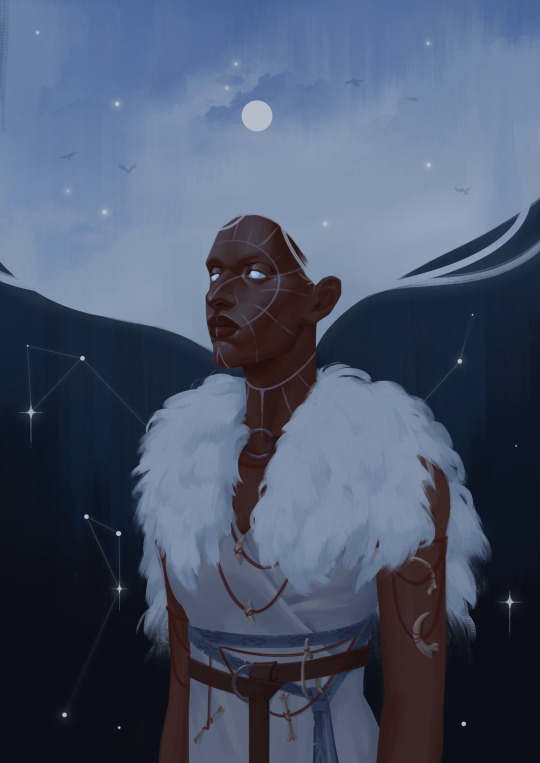
An interpretation I did of Lady of The Skies for Dragon Age Avvar zine! @legend-markzine
228 notes
·
View notes
Text
Okay but they missed SUCH an opportunity with an Avvar Rook and/or companion. Bc the revelations about elves and spirits and gods would just be NOTHING. Spirits are their gods. This is just something that apparently Happens every few hundred years. Then everyone just goes out and kills a god and goes back home for drinking and singing and sex. Typical Tuesday in the Hold.
Bellara: My gods are real spirits that embodied themselves to rain chaos down on Thedas and I'm having a hard time with that...
Avvar!Rook: LOL yeah. But that's like...what the gods do, amirite? Take over a dragon or something, set shit on fire for a while, and then you gotta go kill them and put 'em back in the Fade for Time Out for a bit until they calm down. Lather, rinse, repeat.
Bellara: ... ... ...Okay, but we came from spirits...
Avvar!Rook: Right, the gods! :)
Bellara: No, but they're not real gods because they...were also people who did horrible things.
Avvar!Rook: The gods have each have their own personalities. Some of them are not very nice. That's why we kill them. :)
Bellara: ...I feel like you are way too calm about this.
#dragon age: the veilguard#spoilers#kinda sort of#idk i love the avvar#jaws of hakkon was so good#even if those wyvern things always beat the shit out of me
66 notes
·
View notes
Text

Cultural Views and Interactions with Spirits Across Thedas
The cultures of Thedas have vastly different relationships with spirits, shaped by history, faith, and tradition. While some societies embrace spirits as allies, teachers, or even deities, others regard them with suspicion, fear, or outright hostility. These views often reflect each culture's relationship with magic, the Fade, and the Chantry's teachings.
Broadly speaking:
Northern Thedas tends to demonstrate more openness and integration with spirits.
Central Thedas is likely influenced by both Northern and Southern Thedas, resulting in an amalgamation of cultural beliefs.
Southern Thedas is heavily influenced by Chantry doctrine, enforces stricter separation and suspicion.
The significant exceptions, such as the Avvar tribes and the Dalish elves, whose unique spiritual beliefs set them apart.
Then, we have the Circle of Magi.
Northern Thedas

Tevinter Imperium
Cultural View: In Tevinter, spirits are seen as tools, allies, and occasionally even advisors. Magic and spirits are deeply integrated into society, and the Chantry's warnings are largely...interpreted differently than southern Thedas in favor of practical application. Tevinter mages will often bind spirits and compel them into service.
Key Spirit Interaction Example: In DAI, Dorian speaks openly about spirits with respect, showcasing Tevinter's pragmatic—if morally gray—approach to spirit magic.
(source: Tevinter, Spirit)

Rivain
Cultural View: The Rivaini people, heavily influenced by their Seers, view spirits as part of the natural and spiritual order. Spirits are seen as protectors, teachers, and sacred presences.
Interactions:
- Seers: Rivaini hedge witches, known as Seers, communicate directly with spirits. Southern Thedas believes that Seers often allowing themselves to be possessed willingly for the benefit of their communities. However, in the codex entry ‘Riviani Seers and Spirits,’ Taash notes that the Seers aren't possessed at all. The Seers simply open themselves up and share their body. - Spirit Amulets: Seers craft "Amulets of the Unbound," magical talismans that protect spirits from blood magic and binding rituals. - Spiritual Integration: Spirits are welcomed into villages and trusted to guide important decisions or provide aid in crises.
Key Spirit Interaction Example: During Taash's personal quest, a Rivaini Seer allows a spirit to speak through her rather than fully sharing her body. The spirit, having spent considerable time around the Ancient Qunari, respected the Qun's beliefs about possession but still wished to offer its assistance.
(source: Rivain, Spirit)

Antiva
Cultural View: The Fade Codex is theorizing that it appears that in Antiva, spirits are neither overtly worshipped nor deeply feared but are instead accepted as a natural part of the world. The Antivan people generally remain untroubled by the occasional presence of spirits.
While Chantry teachings are widely followed in Antiva, they seem less rigid compared to the stricter interpretations in the South—likely a result of Antiva's origins as a nation founded by pirates and mercenaries, who valued pragmatism and adaptability over dogma.
Key Spirit Interaction Example: The Treviso marketplace, there are spirit cats lounging around, which reflects Antiva's relaxed approach to spirits, to some degree.
(source: Antiva, Spirit)
Central Thedas

Nevarra
Cultural View: Nevarrans have one of the most unique relationships with spirits in Thedas, deeply intertwined with their cultural views on death and the Fade. Spirits are seen as natural caretakers of the dead and necessary intermediaries between the mortal world and the afterlife.
The Mourn Watch (an elite group of Mortalitasi) avoids using the term "demon." Instead, they refer to what most of Thedas would call a "demon" as a "maligned spirit."
Interactions:
- Mortalitasi Mages: These spiritual leaders interact directly with spirits, often guiding them in rituals surrounding death and the Fade. - Guardians of Tombs: Spirits are sometimes bound to tombs or structures, protecting the dead and ensuring the Fade remains undisturbed. - Rituals of Passing: Spirits play an essential role in guiding souls to their rest.
Key Spirit Interaction Example: In DATV, we see a number of different interactions in the Grand Necropolis regarding spirit interactions. Such as benign spirits being placed in skeletons to help with the upkeep of the building, Curio and Keepsake helping with the return on Manfred, etc.
(source: Nevarra, Spirit)
Southern Thedas
Ferelden and Orlais
Cultural View: Both Ferelden and Orlais follow strict Chantry teachings, viewing spirits with fear and suspicion.
Interactions:
- Spirit interaction is largely confined to the Circle of Magi and heavily monitored by Templars. - Any uncontrolled interaction with spirits is viewed as dangerous, with possession considered an abomination.
Beyond the Chantry's Reach: The Avvar and Dalish Spirit Traditions

Avvar
Cultural View: The Avvar revere spirits as "gods," integrating them into their culture, mythology, and daily lives. Spirits are not merely distant entities but active participants in Avvar society, deeply interwoven with their survival, rituals, and spiritual guidance. Unlike the Chantry's fear of spirits, the Avvar see them as powerful allies deserving respect and proper rituals to maintain harmony.
Neither the Chantry nor its Templars are welcome in the Frostbacks, as Avvar rituals often involve spirits speaking through their casters—practices the Chantry would deem heretical. However, the Avvar are deeply aware of the dangers of spirit interactions and have developed rituals to safeguard against corruption and possession.
Interactions:
Augurs – Spiritual Leaders:
The Augur, chosen from the hold’s mages, serves as a mediator between spirits and the hold, interpreting omens, guiding rituals, and advising the Thane. They appease spirit gods through ceremonies to protect the hold and drive away malevolent spirits. Augurs allow apprentices to host spirits temporarily, teaching mages patience and control over their magic. If an apprentice fails to release the spirit through ritual or risks corruption, they are quietly executed to prevent harm.
Spirit Bonds:
Spirits actively participate in Avvar life, guiding warriors, aiding mages, and protecting the hold from harm. These bonds are built on respect and reciprocity, with spirits offering blessings, wisdom, and strength in return for proper reverence.
Combat and Spirits:
During ritual combat, spirits are drawn to Avvar warriors, enhancing their reflexes, strength, or endurance. This bond resembles the connection seen in Spirit Warriors, with warriors embracing spirits as sacred allies in their battles.
Ritual Safeguards:
The Avvar use structured rituals to ensure spirits do not linger in mortal hosts or become corrupted. These traditions, developed long before the Circle of Magi, reflect a deep understanding of spirit behavior and the Fade.
Spiritual Duties:
Augurs also prepare the dead for the Lady of the Sky, interpret omens from nature, and preserve the old songs and lore of their people.
Key Spirit Interaction Example: In DAI, Avvar shamans openly invite spirits to aid their people, fostering deep trust and cooperation. Warriors receive spiritual blessings during combat, and mages learn magic through spirit guidance, reflecting the Avvar's balanced and structured approach to spirit interaction.
(Source: Avvar, Spirit)

Dalish Elves
Cultural View: The Dalish hold a deeply cautious view of spirits. While they do not inherently view demons as evil, they see all spirits as wild and dangerous, comparable to untamed animals.
Interactions:
- Dalish mages are expressly forbidden from using spirit magic, as spirits are considered unpredictable and inherently risky. - Felassan's Insight: The Dalish believe demons are not evil but are dangerous if treated carelessly. - Merrill's Perspective: In DA2 Merrill reveals that the Dalish believe "there's no such thing as a good spirit."
Key Spirit Interaction Example: Merrill's attempts to interact with spirits and her controversial use of blood magic highlight the tension between Dalish caution and the pursuit of knowledge.
(source: Dalish, Spirit)
The Circle of Magi: Doctrine, Control, and Spirit Interaction
Spirit Healers
Cultural View: Within the Circle of Magi, Spirit Healers represent a unique and often controversial branch of magical study. These mages form bonds with benevolent spirits—typically those embodying fortitude, compassion, hope, or faith—to channel restorative magic that far exceeds the capabilities of traditional healing spells.
While the Chantry acknowledges the value of Spirit Healers, particularly in times of war or crisis, the Templars remain deeply suspicious of their practices. Spirit Healers walk a precarious line in the eyes of the Circle, seen as both invaluable assets and potential risks, as their reliance on spirits is viewed as dangerously close to inviting possession.
Interactions with Spirits:
Benevolent Bonds: Spirit Healers summon and form connections with spirits of compassion, hope, or fortitude, persuading them to lend their power to heal wounds, restore vitality, and alleviate suffering.
Spirit as an Ally: The spirit does not typically cross the Veil fully but instead channels its power through the mage, acting as an ally rather than a master or servant.
Advanced Healing: While standard healing spells can mend physical injuries, Spirit Healers can cure grievous wounds, cleanse diseases, and even stabilize those on the brink of death with their spirit’s aid.
Role Within the Circle:
Desirable Yet Distrusted: Spirit Healers are highly valued for their unparalleled healing abilities, especially in times of war, plagues, or crises. However, their reliance on spirits causes them to be monitored closely by Templars for any signs of corruption or possession.
Rare Practice: Few mages pursue this path due to the intimate bond required with a spirit and the risks associated with such relationships.
Templar Suspicion: Templars remain wary, fearing that the line between collaboration and possession is dangerously thin for Spirit Healers
(source: Spirit)
#thefadecodex#dragon age#dragon age 2#dragon age inquisition#dragon age the veilguard#da#da2#dao#dai#datv#the fade#da spirits#Solas#because he is the Fade Daddy#chantry#the nature of spirits#cultural views of spirits#dalish#avvar#spirit healer#tevinter#tevinter imperium#rivain#veilguard#antiva#treviso#nevarra#mortalitasi#mourn watch#emmrich volkarin
87 notes
·
View notes
Text
I think the inquisitor should have been an outsider to the Andrastian faith in all their origins. I.e., I think the human should have been an Avvar who was spying on what the Lowlanders were up to on their turf.
The reason I believe this is because much of the writing of the inquisitor feels too neutral/agreeable to the religious institution, and I suspect that was to compensate for the human. So it is quite restrictive in how much your character can have an internal crisis as the institution swallows you up.
The other three origins were outsiders from the start. So, I believe that, had the human been Avvar, the writing could have been more confrontational and consistent in tone and theme; you can explore the different ways the inquisitor's personal identity dissolves into the inquisition.
I would have loved it if the inquisitor could have chosen one of the following: accept the script (convert, so to speak), compromise on it (put on a face to keep the world from burning), or fought against it (much to the ire of the andrastians around them).
135 notes
·
View notes